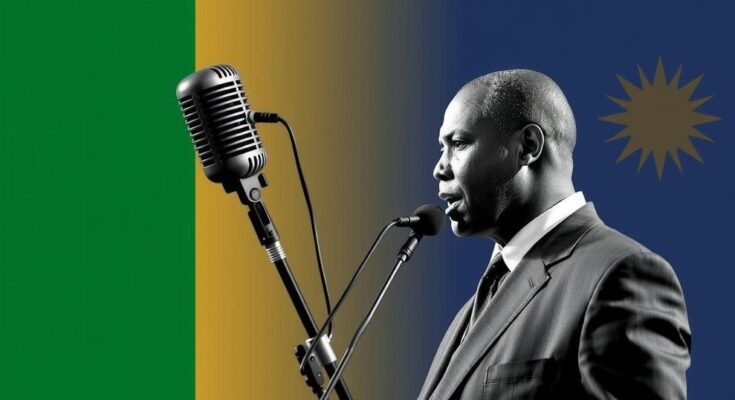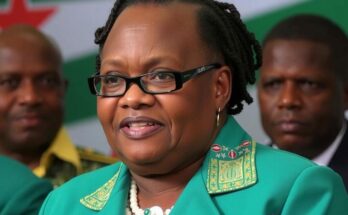Namibia votes in a presidential election, potentially leading to its first female leader, Netumbo Nandi-Ndaitwah, the ruling SWAPO party’s candidate. Amid growing economic challenges and high unemployment, especially among youth, SWAPO faces increased voter frustration, mirroring political shifts seen in neighboring countries. Approximately 1.4 million citizens are registered to vote, with significant implications for the nation’s political future.
Namibia is currently witnessing a pivotal moment in its political history as the nation votes in a presidential election that could mark the ascent of its first female leader. Netumbo Nandi-Ndaitwah, aged 72, a prominent figure in Namibia’s independence movement since the 1970s and the current vice president, is the candidate for the ruling SWAPO party. Recent early voting results indicate she holds a strong lead among both overseas citizens and military personnel.
Despite SWAPO’s historical dominance in Namibian politics since the country gained independence from apartheid South Africa in 1990, the party faces increasing dissatisfaction among the electorate due to high unemployment rates and economic struggles, particularly among the youth. This dissatisfaction echoes recent political shifts in the region, demonstrated by significant electoral losses experienced by other long-standing ruling parties, such as the African National Congress in South Africa and the ruling party in Botswana.
Approximately 1.4 million Namibians are registered to vote in this election, which not only determines the presidency but also shapes the composition of Parliament. While Nandi-Ndaitwah is viewed as a viable candidate for change, she contends with 14 other presidential hopefuls, one of whom is Panduleni Itula, a former dentist and significant opponent from the previous election. Should no candidate secure over 50% of the votes, a runoff will be conducted, a situation that has yet to occur in Namibia’s electoral history.
The recent passing of former President Hage Geingob and the subsequent ascendance of his vice president, Nangolo Mbumba, has added an unexpected dynamic to the election landscape. Nandi-Ndaitwah’s campaign has focused on addressing youth unemployment, with a commitment to spend around 85 billion Namibian dollars ($4.7 billion) to create more than 500,000 jobs over the next five years, although critics question the feasibility of such ambitious promises. Additionally, issues pertaining to women’s rights, including reproductive health and gender pay equity, are paramount for voters in this country with a sparse population of just over 3 million.
Namibia, a country located on the southwestern coast of Africa, gained independence from South African rule in 1990. Since then, it has been governed by the SWAPO party, which emerged from the struggle for independence and has maintained control over the political landscape for over three decades. However, the party’s popularity has dwindled recently, attributed to economic challenges and high unemployment, particularly among younger generations. Amid this backdrop, Netumbo Nandi-Ndaitwah, a veteran of the independence movement, represents hope for potential change in leadership, with her presidential candidacy being a significant moment for female representation in a continent where such leaders are often underrepresented.
The Namibian presidential election represents a crucial juncture for the nation, with the possibility of witnessing its first female leader in Netumbo Nandi-Ndaitwah. Her candidacy comes at a time of growing public dissatisfaction with the ruling party’s performance, particularly regarding economic challenges and youth unemployment. As the election unfolds, the outcome will not only determine the future leadership of Namibia but could also set a precedent for female leadership in the region and address vital issues affecting women and the youth.
Original Source: abcnews.go.com




